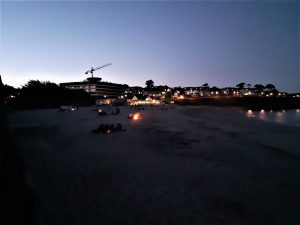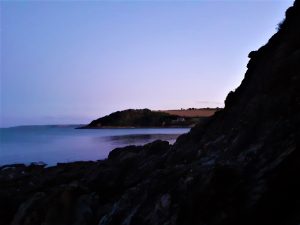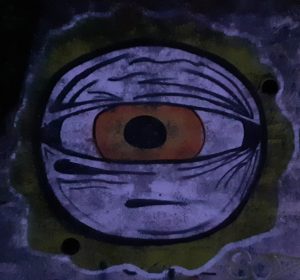
I decided to go down the beach the other night and, living in Falmouth, the most obvious choice was Gyllyngvase, otherwise known as Gylly. For those who don’t know it, it’s a long stretch of beach with a restaurant and toilet block at one end and a large amount of rocks (but not cliffs) at the other.
It only really changes when the path with bins and benches changes into a sea wall and beach plus a cliff path with an annoying amount of brambles. My aim for that night was to walk to the rocky end, read for a bit, take some photos, then walk back again. Nice. Lovely. Should’ve tired me out, but no. I started writing this piece at 3am.
I walked along the beach until I hit the sea wall and it was only then I looked back from where I’d come from. The lights from the restaurant were shining in the pre-sunset light; the construction work circling the hotel across the road had its warning lights up and gleaming; the houses across the seafront were beaming with light. And I suddenly felt a pain in my stomach.

People come to Cornwall to see the countryside, the seaside, to get some of that “country air”. They come from cities and towns all around the country. Busy places, full of lights and noise and people. They come for peace and quiet. But that has disappeared, giving way to electric lights which blaze, bold as brass. I understand some are necessary. We have Pendennis Castle, which has been shining for hundreds of years, and St Anthony Lighthouse, a need to prevent shipwrecks. There’s a Navy ship out there currently, and a few weeks ago, the World, an expensive cruise ship which travels the globe, was parked up.
But there I was. In front of me, I could see two houses, and a few sailing boats. Behind me, places with high electricity bills and, on the sand, people with cheap Tesco barbecues. It was as though walking forward was sending me backwards in time. I sighed and kept walking.

Eventually, I found a place to settle down and start reading. I took out some of the food I’d brought with me and started eating. A family consisting of two adults, two dogs, and two boys came along, and all six of them started playing loudly. I resented them for interrupting my reading and moved further along the beach. I passed a young couple, wrapped up and snuggled into each other, obviously having had the same idea as me to find somewhere quiet and away from other people. I walked past them, the three of us ignoring each other.
By this time, the places with high electricity bills were out of sight, and I breathed a sigh of relief. I don’t know why it hurt me, but it did. It does. People come to Cornwall to temporarily escape their bustling lives, but they’re happy to stay in a place that’s just as bustling as their home. During tourist season, Cornwall’s towns, villages, and city are just as insane as the towns and cities from whence the tourists came. I’ve queued for longer in Helston, Penzance, Falmouth, Truro, than I ever did in Oxford.
Eventually, I came to the end of the beach. I ignored some boys who stared at me with confused expressions on their faces and concentrated more on trying not to fall off the rocks I was climbing over, barefoot. (Only later did I notice that my feet had been ripped to shreds. Well done, me.) I took some photographs, and, once again, looked back towards where the lights were coming from. Climbing so high on the rocks, I could once more see it – the restaurant, the castle, the hotel’s scaffolding.
I’ve said it twice and I’ll say it again. It hurts me. It pains me to see so many electric lights, people going to and from their jobs without looking at anyone else. People come here on their holidays, expecting to find a tranquil wonderland, one that’s calm and peaceful and where nature covers every square foot. But it’s not. Sure, it’s not as busy as London or Oxford or Cardiff. It’s not as insane as something you might find in a Lewis Carroll novel. But it’s as bustling as can be.

Please, don’t think that I don’t love my home. I do. As I’ve previously written, I love going out at night and being able to look up at the stars. I love having decent alcohol. I love the beach, the views, the people. There’s a beauty in Cornwall that I’ve never caught anywhere else.
But for those who don’t know modern Cornwall, just the olde-worlde type written in Daphne du Maurier novels, life here is unexpected.
Me eating a whole box of Jaffa Cakes whilst down the beach is expected. Me accidentally setting my smoke alarm off whilst cooking is expected.
For emmets, coming to the tranquillity of the countryside and finding it just as insanely busy as your hometown… that- that is unexpected to say the least. And for me, it’s heart-wrenching.
